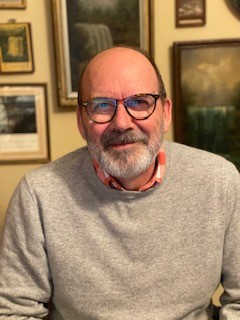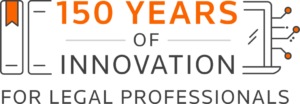Thomson Reuters Celebrates 150 Years: Jerry Barnaby on Why We Innovate

Thomson Reuters is commemorating 150 years of customer partnership and innovation to honor the 1872 founding of John B. West Publisher and Book Seller. West’s innovative spirit lives on in Westlaw – a product that still carries his name – and in the AI-driven products and legal research technology tools used by legal professionals worldwide.
Our Legal Current series features voices across Thomson Reuters sharing how West’s legacy of customer partnership and innovation endures today. We hear today from Jerry Barnaby, manager, Cases Editorial Topical Areas, who has worked at Thomson Reuters for 27 years.
Prioritizing customers
Barnaby’s tenure includes serving as a reference attorney and several roles in the “heads-down editorial part of the company.”
“One of the things that has made my career here successful is that there are so many opportunities, and that marries up with the encouragement to find a place where you thrive,” he said. “Having the freedom to move between Reference Attorneys and editorial groups – and feeling like when I moved on to the next one that I’ve made a difference – is really encouraging. Thomson Reuters as an employer is world-class not only because of what we do, but because of the culture and support given to individual employees.”
“Customers are our top priority,” he noted, adding it’s true across customer-facing and editorial roles. He believes it’s why John B. West’s legacy of customer partnership endures.
“Being in the content editorial space, I can firmly say that as we are creating our content, we’re always thinking, how will customers use this? How can we make it better for customers?” Barnaby said.
“Always thinking about what might be next for our customers” has sustained the company’s reputation for customer-driven innovation.
“We’re never satisfied with where we are right now,” he explained. “There’s always this view towards what could be next – anticipating what customers need before they might know themselves. We’re blessed with visionary folks who are working on behalf of customers and are driving us towards those greater customer solutions. Never being content with what we offer currently is really a key to why we innovate.”
Rethinking editorial enhancements
This approach played out in the Westlaw Precision launch, which Barnaby called “groundbreaking” and the most exciting project he has worked on at Thomson Reuters.
He described it as “the rethinking of how we can leverage the existing editorial enhancements we’ve done – primarily the headnotes – and pulling out information that attorneys will use to refine their research to find factually similar and legally similar issues more quickly.”
“Precision Research on Westlaw Precision is a revolutionary advance in online legal research,” Barnaby added. “Leveraging the wealth of information in our proprietary headnotes, we’ve added new components to a researcher’s toolkit, allowing them to search and filter by attributes like party, legal issue, material facts, and more. The result is finding factually and legally relevant cases much more quickly.”
He expects Westlaw Precision to be as impactful as the 2018 launch of Westlaw Edge with the Statutes Compare feature.
 Engaging end users
Engaging end users
Barnaby said customer collaboration is always critical to product development at Thomson Reuters.
“In the legal technology legal research business, it only makes sense to engage the end users and ask them what they want,” he said. “It’s smart to do that up front as you’re doing some of that vision building. But it’s even more important as you’re moving new ideas forward to have customers as the touch point to confirm you’re moving in the right direction and not losing sight of the end use.”
He said the customer feedback loop continues after the product goes to market: “Having customers involved along the various stages of product creation is important – not only in innovating for new products, but also in maintaining content and having avenues within the company to get customer feedback on the products that we have now.”
Old-school legal research
Barnaby said during his nearly 30-year tenure, the evolution of the legal space has been “technology driven, conflicted and efficiency focused.”
Technology has greatly benefited the legal profession, he said, “but the tension part comes with practitioners who love what they know and don’t necessarily want to move beyond that. And that’s why there’s this conflict of doing what’s best versus doing what’s comfortable.”
He said the drive for efficiency compelled many legal professionals to explore, and eventually embrace, technology.
“Attorneys are forced to justify how they’re spending their time, and old-school legal research is much more time intensive than the technology-based solutions that we have for them,” Barnaby explained. “We’ve kind of forced some practitioners to move outside what’s comfortable for them, and we have really supported and helped them embrace the technology – allowing them to flourish by providing solutions with those great efficiencies built into them.”
Read more perspectives on the Thomson Reuters legacy and watch Legal Current for additional stories in the coming weeks.